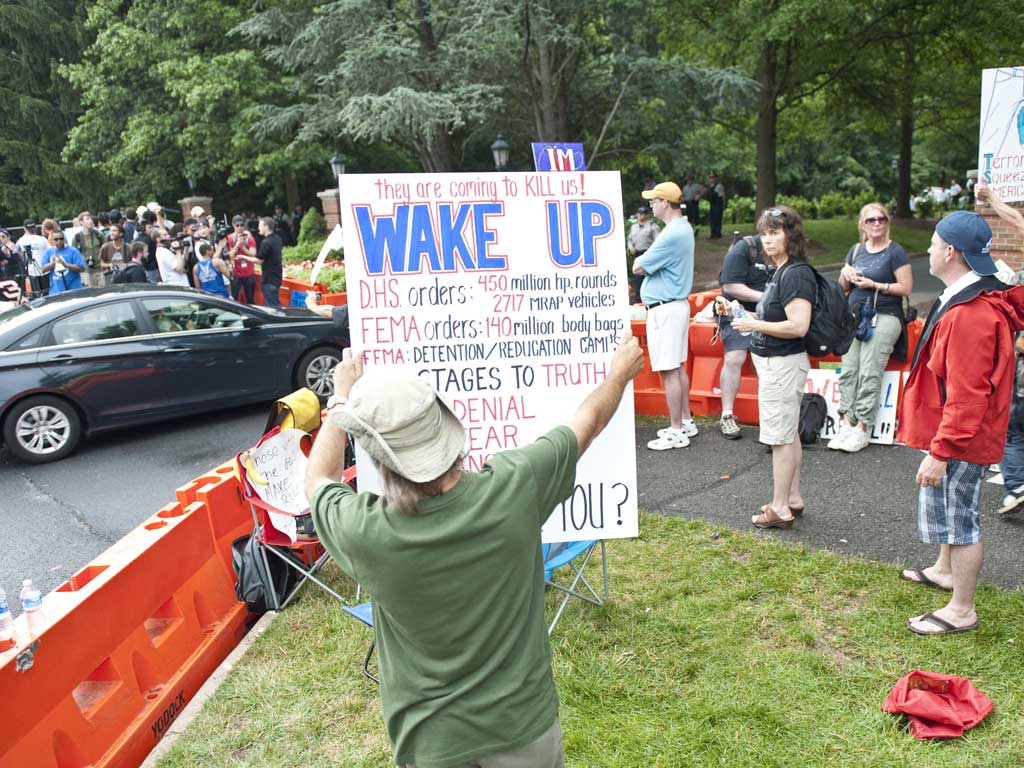What exactly does happen inside Bilderberg, the top secret meeting of the world's most rich and powerful?
Take one Bilderberger’s account of Margaret Thatcher’s appearance at the 1975 gathering, as told to the author Jon Ronson: “David Rockefeller and Henry Kissinger fell in love with her. They took her around in limousines, introduced her to everyone"


Your support helps us to tell the story
This election is still a dead heat, according to most polls. In a fight with such wafer-thin margins, we need reporters on the ground talking to the people Trump and Harris are courting. Your support allows us to keep sending journalists to the story.
The Independent is trusted by 27 million Americans from across the entire political spectrum every month. Unlike many other quality news outlets, we choose not to lock you out of our reporting and analysis with paywalls. But quality journalism must still be paid for.
Help us keep bring these critical stories to light. Your support makes all the difference.
And so the rich and powerful have landed for this year’s Bilderberg meeting.
The bosses of big banks and big oil are chatting behind closed doors with ministers and prime ministers, with Dr Henry Kissinger and former heads of the CIA and MI6.
And we won’t know a thing about what happens inside the Taschenbergpalais Hotel in Dresden this weekend. No minutes are taken, no reporters allowed.
It’s hard to think of a more brazen affront to democracy, of a more squalid global elite stitch-up, isn’t it? Shouldn’t we be demanding an end to this secrecy?
Well, actually, no.
Sometimes, just sometimes, it might be a good idea for the rich and powerful to talk without us knowing what they’re saying.
Because professionally speaking, if my grandmother were still alive, I probably would sell her for the chance to get into the Taschenbergpalais with a hidden recorder, to scandalise the world with everything I heard.
So yes, there is a risk the Bilderberg gang are busy plotting world domination. But there’s also a chance they are trying to tackle some pretty tricky issues, without a screaming headline shouting them down before they started. The global drugs problem? Try having a sensible discussion about that in public. The idea of stopping terrorists by talking to them? Ditto.
And as for the global domination stuff, the anointing of US presidents, the fixing of wars and everything else: God how I wish that were true.
But I’ve been let down by conspiracy theories before. They seem so exciting when you first meet them, but when you get to know them they turn out to be flaky, unreliable.
Take one Bilderberger’s account of Margaret Thatcher’s appearance at the 1975 gathering, as told to the author Jon Ronson: “David Rockefeller and Henry Kissinger fell in love with her. They took her around in limousines, introduced her to everyone.”
And four years later, she’s Prime Minister. Wonderfully sinister, isn’t it? Until you think about how Bilderberg steering committee stalwart Denis Healey must have felt about being bumped from the position of Chancellor by Maggie’s 1979 election victory.
And look at one of this year’s Bilderberg attendees: Marcus Agius. In 2012 he resigned as chairman of Barclays after the bank was fined £290 million for trying to fix the Libor rate. “The buck stops with me,” he simpered. “I am truly sorry.”
That’s not an Illuminati mastermind. That’s a man who has just failed GCSE global domination, who never even got to participate in the conspiracy anyway.
I hope I am being naïve and complacent, but I fear the grim truth is that the world is too messy to allow a smoothly-running global conspiracy of everything.
Which doesn’t mean we should move along from the Taschenbergpalais’ security barriers.
There is still a lot to see, possibly encapsulated in Healey’s remark to Ronson: “To say we were striving for a one-world government is exaggerated, but not wholly unfair. We felt a single community throughout the world would be a good thing.”
He may have dismissed conspiracy, but Healey seems – unwittingly – to have come pretty close to admitting groupthink.
And while those who created Bilderberg in the postwar years may have had a hinterland, which in Healey’s case included experiencing shellfire as beachmaster at Anzio, you wonder what the class of 2016 have experienced.
They look uncannily like men – and it is mainly men – who have transitioned smoothly from MBA to boardroom, from Spad to minister.
There is – obviously – no way of knowing whether there are violent disagreements at Bilderberg, but they seem likely to fall into the category of the narcissism of small differences.
And if travel broadens the mind, then regardless how many miles it took the delegates to get to Dresden, it hardly seems they have journeyed far mentally.
They don’t ponder the world after decamping to the favelas or enduring a three-day stretch on one of Mike Ashley’s zero hours contracts. They swap boardrooms and ministerial offices for the equally sanitised surroundings of a five-star hotel – Saturday afternoon off for golf, allegedly.
Bilderberg starts to look like a great place for the gilded elite to develop its own pan-national, self-affirming, complacent mindset.
And the “little people” behind the security barrier are starting to catch on. And to turn from “elite” to insurgent politicians.
Hence Trump. Hence the real possibility that come November a bile-filled demagogue will beat a relatively sane “machine politician” to the White House.
It would kind of disprove the whole global conspiracy thing. But it wouldn’t help anyone much, would it?
Join our commenting forum
Join thought-provoking conversations, follow other Independent readers and see their replies
Comments